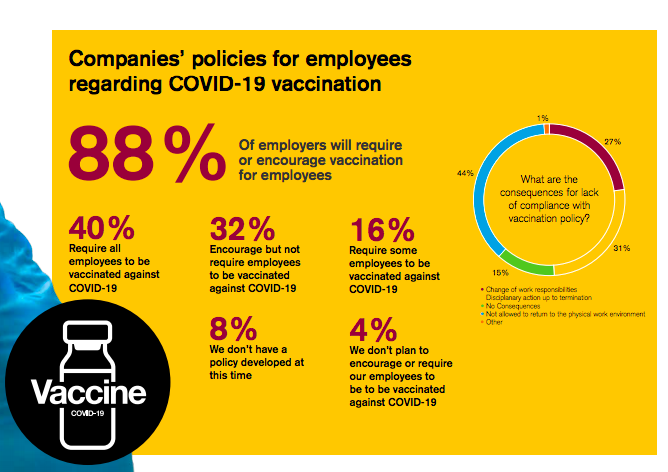In recent days, employers have been updating their policies regarding COVID-19 vaccines and the workplace as regulations and guidelines evolve.
Following federal, local and state guidelines, the policies may vary on a state by state basis. We recommend keeping up to date with OSHA guidelines to ensure your business is following the latest vaccine guidelines.
Many business owners, however, are wondering what to do. According to one survey, vaccinations were at the top of the priority list. With many of the same questions circling, like can they require their employees to be vaccinated? Can they ask if an employee is vaccinated?
The survey found that, “Some 88% of the 1,339 employers surveyed said they planned to require or encourage their employees to be vaccinated against COVID-19. The same survey found that 60% of employers said they will require proof of vaccination from employees, and 57% said they plan to incentivize their employees to be vaccinated.”

To help business owners set policies, we answer some of the most common questions to date regarding COVID vaccinations in the workplace.
Can Employers Require Employees To Be Vaccinated?
Yes, employers can legally require their employees to get vaccinated. However, you must offer justification for why the vaccination is necessary.
For example, let’s say you have remote employees who don’t come to an office day in, day out. The justification for the vaccination is harder to justify than businesses that have employees working closely with one another and customers alike.
“I think that the EEOC [Equal Employment Opportunity Commission] guidance is pretty clear that employers are permitted to mandate vaccines if they want to, but they have to have the basic protections in place that they would for any kind of medical mandate so your employers would have to comply with any request for accommodation by an employee, or basically a waiver by an employee based on disability or religious grounds,” says Cathy Ruckelshaus, legal director at the National Employment Law Project.
Consider The Vaccine Provider
As an employer, you must decide if you will administer the vaccine yourself, through a third party or a public vaccine provider. The route you take may require pre-vaccination medication screenings as required by the government. The screening questions look to uncover if the employee has a disability which will further require ADA protection.
Therefore, if you are carrying out the vaccines yourself, you must ensure that the questions you ask in a pre-screening comply from a business standpoint.
“Under the ADA, an employer can have a workplace policy that includes a requirement that an individual shall not pose a direct threat to the health or safety of individuals in the workplace.”
We recommend going the public vaccine provider route, like a pharmacy, so that you and your business avoid the ADA risks.
What Are the EEOC Guidelines On Vaccinations?
“According to the EEOC, Employers may encourage or possibly require COVID-19 vaccinations, but policies must comply with the Americans with Disabilities Act (ADA), Title VII of the Civil Rights Act of 1964 (Title VII) and other workplace laws, according to the EEOC.”
Employers must consider employees with disabilities and religious objections.
Disability Considerations
As mentioned, the ADA assesses employee disabilities, but as an employer, you must determine whether this would pose a direct and immediate threat to the health and safety of the employee, the other employees, and customers.
The EEOC recommends looking for four factors to determine the threat level: risk duration, severity level of potential harm, likelihood of potential harm, and imminence of potential harm.
If the employer finds reasonable harm, then they must decide if the employee can do their job remotely, if the employee should take a level of absence, or if termination is the answer. The employer and employee should discuss it together to determine the best course of action.
“Managers and supervisors responsible for communicating with employees about compliance with the employer’s vaccination requirement should know how to recognize an accommodation request from an employee with a disability and know to whom the request should be referred for consideration,” the EEOC said.
Religious Considerations
“Title VII requires an employer to accommodate an employee’s sincerely held religious belief, practice or observance, unless it would cause an undue hardship on the business. Courts have said that an “undue hardship” is created by an accommodation that has more than a “de minimis,” or very small, cost or burden on the employer.”
Considering the above, an employer may have an “objective basis” to question the employee’s sincerity in regards to their religious considerations. Therefore, the employer would be justified to request any information in support before taking any extreme next steps.
Can Employers Ask If Employees Are Vaccinated?
Yes, employers can inquire if employees are already vaccinated.
Many assume that due to HIPAA (Health Insurance Portability and Accountability Act) such information is not available but that isn’t the case.
“People are under the incorrect impression that nobody is able to ask you for anything related to your medical history, or your current medical status including your vaccination status,” says Kimberly Hall, an employment attorney.
Employers can only ask if their employee has the vaccine and nothing more relating to their medical information.
Employers Can Recommend COVID Vaccinations
As an employer, you can create new policies and implement incentives to encourage and recommend your employees get vaccinations. And find out why some employees don’t want to get the vaccination – it may be because of a disability, other health issues, their religious beliefs, or maybe it’s something else altogether. Do your due diligence and find out what’s behind the refusal. Maybe there’s something you can do to help.
Consider that maybe they don’t have time to drive to their vaccination center, or they don’t have a car, or maybe they are afraid of next-day symptoms and can’t afford to miss a day of work, and so on. It could be a logistical reason. If that’s the case, remind them that they’re protected, as are you, by the American Rescue Act of 2021.
In other fashion, adjust your company policy to encourage employees to get vaccinated for example start education campaigns to share with them, support them logistically, offer an incentive to anyone who does get vaccinated, offer paid time off for anyone who goes to get the vaccination during work hours, offer paid recovery time if they suffer from side effect, and so on.
Attorney Kevin Troutman recommends that you “Communicate clearly and often with employees and help them understand how vaccinations will make for a safer workplace Lead by example and ensure that management takes the vaccines first.”


